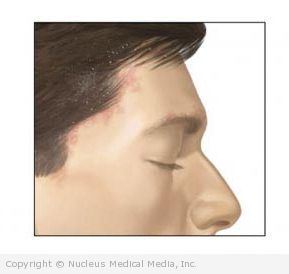Seborrheic dermatitis – Dandruff
Dandruff – Definition
Seborrheic dermatitis is a chronic skin condition that causes a scaly, itchy rash. It can appear as a mild, white scaling or a yellowish greasy or reddish scaly rash. Most commonly affected areas are along the hairline, in and behind the ears, on the eyebrows, around the nose, and on the chest.
Dandruff is a type of seborrheic dermatitis where there is a scaling of the skin on the scalp. The area can be dry or oily and is sometimes itchy.
Dandruff – Causes
The exact cause of seborrheic dermatitis is unknown, though common skin yeast organisms, called Malassezia, may play a role in some people.
Dandruff – Risk Factors
Risk factors include having:
- Oily skin or hair
- Family members who have seborrheic dermatitis
- Chronic condition, including disorder of the immune system (eg, HIV infection)
- Neurological conditions, such as Parkinson’s disease or, less commonly, stroke
Dandruff – Symptoms
The symptoms can vary from mild to severe. They include:
- Dry or greasy scaling of the scalp
- Itchy scalp
- Itchy, scaly rash with small pimples
- Thickened, flaking skin
- Reddened skin over the forehead and on either side of the nose
In babies less than one month old, seborrheic dermatitis may cause a thick, yellow, crusted scalp rash known as “cradle cap.”
Dandruff – Diagnosis
The doctor will ask about your symptoms and medical history and perform a physical exam. You may be referred to a doctor who specializes in skin disorders (a dermatologist).
Dandruff – Treatment
Treatments for seborrheic dermatitis are usually applied directly to the skin in the form of shampoo or lotion. Treatment depends on the severity of your symptoms.
There are many products to treat dandruff. Examples include:
Medicated Products
A variety of treatments are used for seborrheic dermatitis, such as:
- Prescription or over-the-counter shampoos containing one or more of the following ingredients:
- Zinc pyrithione
- Hydrocortisone (eg, Hydrocortone, Cortef) or other cortisone (steroid) preparations
- Selenium sulfide (eg, Dandrex, Exsel, Selsun Blue)
- Salicylic acid (eg, Sebex, Sebulex)
- Coal tar (eg, Denorex, Pentrax, Tegrin, Zetar)
- Ketoconazole (eg, Nizoral, Extina, Xolegel, Kuric) or other antifungal medicines
- Prescription or over-the-counter creams or lotions containing:
- Hydrocortisone or other cortisone (steroid) preparations
- Ketoconazole or other antifungal medicines
- Pimecrolimus (eg, Elidel)
- Promiseb — a nonsteroidal cream that is anti-inflammatory and antifungal
- Treatment can take several weeks or months and may need to be repeated if the condition recurs.
Dandruff – Prevention
There are no guidelines for preventing seborrheic dermatitis because the cause is unknown. If you have seborrheic dermatitis, following treatment guidelines may help prevent a recurrence.

